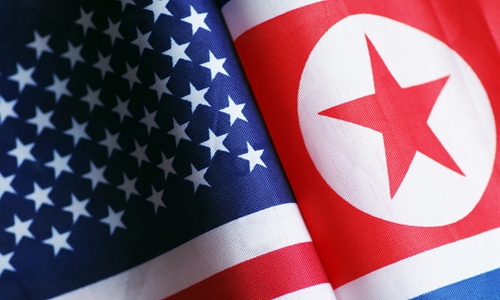HOME >> OPINION
Will Kim-Trump personal ties help Korean Peninsula flare-up?
By Cheng Xiaohe Source:Global Times Published: 2019/12/16 21:48:41

Photo: IC
US-North Korea talks have been stalled since early October. As the year-end deadline set by Pyongyang for Washington to soften its approach to stalled denuclearization talks is approaching, we see no hope of quick resumption of negotiations. North Korea and the US have drummed up their rhetoric, and the Korean Peninsula is seemingly poised to brace for a new round of crisis in the near future after a nearly two-year hiatus.It is no secret that the US and North Korea are at odds over the issue of denuclearization versus sanctions and they have struggled to find a solution. Nonetheless, the year-end deadline has itself become a new bone of contention between the US and North Korea. As early as October 24, Kim Kye-gwan, a top adviser to North Korea's Ministry of Foreign Affairs, gently reminded Washington, "We want to see how wisely the US will pass the end of the year." Kim Yong-chol, chairman of the Korea Asia-Pacific Peace Committee, publicly warned on October 27 that "the US is seriously mistaken if it is of the idea of passing off in peace the end of this year, by exploiting the close personal relations between its president and the chairman of the State Affairs Commission of the DPRK for the delaying tactics."
Since then, North Korea stepped up the pressure on the US and clearly signaled that Pyongyang treats the deadline seriously and if Washington does not respect the time limit or takes bold and flexible action, it will bear the consequences.
Pyongyang does not hide its aversion to former White House national security adviser John Bolton and Secretary of State Mike Pompeo. On April 18, Kwon Jong-gun, a director general of North Korea's Ministry of Foreign Affairs, said, "Whenever Pompeo pokes his nose in, the talks go wrong without any results even from the point close to success." He noted, "In the case of possible resumption of the dialogue with the US, I wish our dialogue counterpart would be not Pompeo but other person who is more careful and mature in communicating with us." Therefore, even though Pompeo had visited Pyongyang twice, North Korea doesn't treat him as a trustworthy negotiating partner, and high-level bilateral talks remain deadlocked.
North Korea has also lost its interest in any working-level negotiation with the US. From Pyongyang's perspective, the US negotiators failed to bring any new proposals in the previous meetings. Ri Thae-song, North Korea's vice foreign minister in charge of US affairs, said on December 3 that "the dialogue touted by the US is, in essence, nothing but a foolish trick hatched to keep the DPRK bound to dialogue and use it in favor of the political situation and election in the US." A few days later on December 7, North Korean Ambassador to UN Kim Song declared, "We do not need to have lengthy talks with the US now and denuclearization is already gone out of the negotiating table."
As a clear sign of a crisis looming on the Korean Peninsula, North Korea began to take on US President Donald Trump. For some time, North Korea has tried to separate Trump from his government and his lieutenants. Pyongyang could relentlessly slam some senior US officials, but carefully avoided making any direct criticism of Trump even though they were angry about some anti-North Korea moves of the White House. Trump returned in kind, refraining from criticizing North Korea's ballistics tests. Both Trump and North Korean leader Kim Jong-un publicly confirmed their special relations. Nonetheless, the rapport came under a test.
At the NATO summit on December 3, Trump threatened to use force against North Korea if necessary. The threat immediately triggered North Korea's response. Pak Jong-chon, chief of the General Staff of the Korean People's Army, expressed Kim Jong-un's displeasure and stated, "If the US uses any armed force against the DPRK, we will also take prompt corresponding actions at any level." Choe Son-hui, first vice-minister of foreign affairs, said, "We, Foreign Ministry, too, cannot repress displeasure over the utterances made by President Trump inappropriately at the most sensitive time."
Obviously, almost all of North Korea's senior officials in charge of foreign relations collectively created pressure on the US. In order to buttress their arguments, North Korea has taken concrete steps, including two recent intercontinental ballistic missile engine tests, to convince the world that it is ready to fight if talks fail to yield what Pyongyang wants. Unfortunately, the US shows no sign of backing off from its previous stance. Stephen Biegun, US special representative for North Korea, insisted that the deadline is artificially set and will not be observed by the US government.
The US and North Korea are seemingly heading toward a head-on collision. The last chance to avoid a showdown to a large extent hinges on special relations between Trump and Kim. Even though senior North Korean officials blasted Trump's war rhetoric, they consistently emphasized that "the Chairman of our State Affairs Commission has not used any irritating expression toward the US president as yet." In other words, Kim himself still wants to maintain special relations with Trump.
As long as Trump and Kim remain on good terms, they may find a way to avoid an unnecessary crisis in the first place and find an ultimate solution to the stalled talks on the denuclearization of the Korean Peninsula and lifting of UN Security Council's sanctions against North Korea.
The author is associate professor with the School of International Studies, Renmin University of China; a senior researcher with the Pangoal Institute. opinion@globaltimes.com.cn
RELATED ARTICLES:
Posted in: VIEWPOINT,ASIAN REVIEW